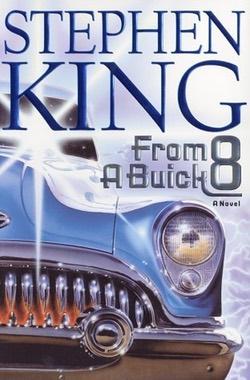The sun is dying, the stars are going out, the dark is rising, and this portion of the re-read is coming to an end with Stephen King’s From a Buick 8.
Why did I skip Everything’s Eventual, his short story collection that came out earlier in 2002? Mostly because I forgot, but also because I’m doing this reread in 10-book chunks and it made sense to end with Buick because rarely has King written a book that feels quite so much like he wants to pack it all up and limp away into the night, never to be heard from again.
It’s not just the rumors that this book would mark King’s retirement. And it’s not just this statement from King while on the press tour for Buick:
“I can’t imagine retiring from writing. What I can imagine doing is retiring from publishing…If I wrote something that I thought was worth publishing I would publish it. But in terms of publishing stuff on a yearly basis the way I have been, I think those days are pretty much over…From a Buick 8…so far as I know [is] the last Stephen King novel, per se, in terms of it just being a novel-novel.”
That turned out to be a lie. King would publish one book a year, only skipping 2010, for the next 13 years, and he published two books in 2004, 2006, 2013, and 2014. But what makes Buick feel like the end of everything is the melancholy, sundown atmosphere that hangs over the whole book which is all about the failures of writing, the failures of story, and the failures of fiction. Neil Gaiman can natter on happily about how we’re all made of stories but From a Buick 8 is King’s final word: stories don’t mean shit.
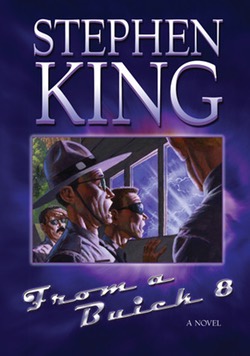 In March, 1999, King was driving back to Maine after wintering in Florida. His wife had flown on ahead, and so when he stopped at a Conoco station in Pennsylvania for some gas he was all alone. Coming out of the bathroom around back, he slipped on some ice and almost fell into a raging stream, swollen with melting snow. There were no witnesses. His wife didn’t expect him back for a few days. If he’d fallen in that icy water he would have been carried off without a trace. Something took root in the base of his brain around 10am and by the time he got to New York City that afternoon he had From a Buick 8 pretty much mapped out. He wrote the first draft in two months, told his publisher what they had coming, and in early June he went for a walk, got hit by a car, and he didn’t touch it again until he’d finished Dreamcatcher, Black House with Peter Straub, and On Writing.
In March, 1999, King was driving back to Maine after wintering in Florida. His wife had flown on ahead, and so when he stopped at a Conoco station in Pennsylvania for some gas he was all alone. Coming out of the bathroom around back, he slipped on some ice and almost fell into a raging stream, swollen with melting snow. There were no witnesses. His wife didn’t expect him back for a few days. If he’d fallen in that icy water he would have been carried off without a trace. Something took root in the base of his brain around 10am and by the time he got to New York City that afternoon he had From a Buick 8 pretty much mapped out. He wrote the first draft in two months, told his publisher what they had coming, and in early June he went for a walk, got hit by a car, and he didn’t touch it again until he’d finished Dreamcatcher, Black House with Peter Straub, and On Writing.
Published in October, 2002, From a Buick 8 didn’t do big business. It appeared at #1 on the New York Times bestseller list but was knocked out of the top spot after only a week, and fell off the chart completely after 11 weeks, making it one of King’s all-time lowest-selling books. It’s not hard to see why. From a Buick 8 is the story of Troop D, a state troopers barracks in Pennsylvania, that takes custody of a car that is definitely not a Buick Roadmaster, despite how much it resembles one. The story is all about telling stories, specifically the long story that Sandy Dearborn tells Ned Wilcox, son of a trooper who was killed in a car accident. Eerily, Curtis Wilcox was walking up the highway when he was struck and killed by a drunk driver who’s messing around with his cooler and not watching the road, much like what happened to King in 1999. Even spookier, the book, written just weeks before King was almost killed by a car, is packed with images of vehicular death and destruction.
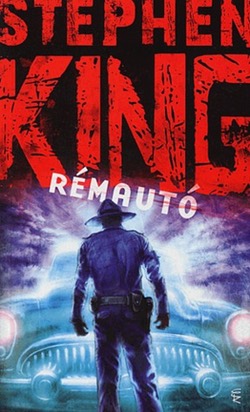 Precognition aside, the spine of the book is the story Sandy tells Ned, who has taken to working at the barracks to feel closer to his dead dad. His curiosity is piqued by the old Buick Roadmaster locked up in a shed out back, and Sandy agrees to tell him all about it. Turns out that Ned’s dad picked it up when it was abandoned at a gas station back in 1979 after the driver went to the bathroom and never came back. Curtis Wilcox discovers that the Buick isn’t quite a Buick. There are a number of things wrong with it, almost like it’s some kind of living machine that’s disguised itself as a Buick but hasn’t gotten the details quite right. Curtis gets obsessed with the car and, over the years, he conducts numerous experiments on it, driving himself bonkers because he can’t figure out what it is. Occasionally, someone will disappear. Sometimes they’re near the Buick, sometimes they’re not, but the Buick seems to be to blame. Sometimes it sets off lightning displays in the shed. Sometimes weird plants and animals are found crawling, creeping, or flying out of the Buick’s trunk. It’s all mystery, and no solution, and Ned Wilcox seems as fascinated as his dad by the almost-car.
Precognition aside, the spine of the book is the story Sandy tells Ned, who has taken to working at the barracks to feel closer to his dead dad. His curiosity is piqued by the old Buick Roadmaster locked up in a shed out back, and Sandy agrees to tell him all about it. Turns out that Ned’s dad picked it up when it was abandoned at a gas station back in 1979 after the driver went to the bathroom and never came back. Curtis Wilcox discovers that the Buick isn’t quite a Buick. There are a number of things wrong with it, almost like it’s some kind of living machine that’s disguised itself as a Buick but hasn’t gotten the details quite right. Curtis gets obsessed with the car and, over the years, he conducts numerous experiments on it, driving himself bonkers because he can’t figure out what it is. Occasionally, someone will disappear. Sometimes they’re near the Buick, sometimes they’re not, but the Buick seems to be to blame. Sometimes it sets off lightning displays in the shed. Sometimes weird plants and animals are found crawling, creeping, or flying out of the Buick’s trunk. It’s all mystery, and no solution, and Ned Wilcox seems as fascinated as his dad by the almost-car.
The thing with King’s books are that they’re really all about the characters — if the characters don’t feel compelling and real then the books don’t take off. Unbelievably evil characters are why Dreamcatcher and Rose Madder feel like they have a hollowness at their core, and while the characters in Buick don’t feel like cartoons, they feel almost too real: they’re boring, salt-of-the-earth state troopers. Not much happens to them, and they don’t do much besides clean up after road accidents and sit around on the smoker’s bench out back, jawing. The result is a friction-less book that slides from one incident of the almost-Buick discharging lightning or disgusting bat creatures, to another without much in the way of narrative tension or structure.
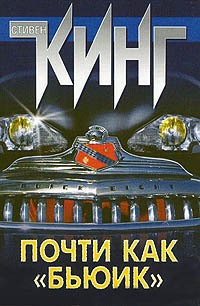 And that’s exactly what King wants. What drives the book forward are Ned’s demands to be told the story of the Buick (and, by proxy, his dad)—demands that start to get under Sandy’s skin. The boy wants closure, he wants answers, he wants a story about the almost-Buick with a beginning, a middle, and an end that provides his father’s life, and death, with meaning. But, as Sandy muses:
And that’s exactly what King wants. What drives the book forward are Ned’s demands to be told the story of the Buick (and, by proxy, his dad)—demands that start to get under Sandy’s skin. The boy wants closure, he wants answers, he wants a story about the almost-Buick with a beginning, a middle, and an end that provides his father’s life, and death, with meaning. But, as Sandy muses:
“The imitation lives we see on TV and in the movies whisper the idea that human existence consists of revelations and abrupt changes of heart; by the time we’ve reached full adulthood, I think, this is an idea we have on some level come to accept. Such things may happen from time to time, but I think that for the most part it’s a lie. Life’s changes come slowly…the whole idea of curious cats attaining satisfaction seemed slightly absurd. The world rarely finishes its conversations.”
Sandy keeps telling Ned about all the other things that happened over the course of the 23 years the faux-Buick sat in their shed, occasionally spitting out lightning or vomiting up some half-dead horror from another world. The baseball games, the picnics, the accidents, the small victories, the human lives lived in the shadow of this dark, unsolvable mystery. But the kid only has eyes for the mystery and it pisses Sandy off. It’s not the mystery that’s important. It’s the life going on around it. In a way, Buick 8 could also be called On Writing.
There’s an echo of the frustration Sandy feels with Ned in a passage from On Writing when King talks about the giant desk in the center of his office. Life went on around him for years as he sat at that desk, drunk or stoned, writing his books. Then, after he sobered up, he put it in the corner. As he writes, “Put your desk in the corner, and every time you sit down there to write, remind yourself why it isn’t in the middle of the room. Life isn’t a support-system for art. It’s the other way around.” What King’s interested in isn’t the supernatural Buick in the middle of this book, it’s the life going on around it.
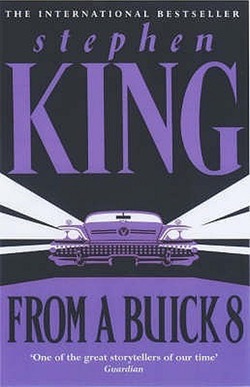 More than a lot of other best-selling writers, King lets his life work itself out on the page. He’s not plotting towards what the market wants and he believes in letting his subconscious play as he writes, his books taking him where “they” want to go, and From a Buick 8 is taking him away from writing about the supernatural. Although he wrote the first draft before his accident, the second drafts are where King says his themes emerge and that’s what seems to have happened here. It’s a book that came out of King’s brush with the senselessness of the accident that almost killed him. It’s a book that, some critics feel, came out of the senselessness of 9/11. Some things just happen. They’re big, they’re important, but you can’t solve them so it’s better to just get on with the business of living.
More than a lot of other best-selling writers, King lets his life work itself out on the page. He’s not plotting towards what the market wants and he believes in letting his subconscious play as he writes, his books taking him where “they” want to go, and From a Buick 8 is taking him away from writing about the supernatural. Although he wrote the first draft before his accident, the second drafts are where King says his themes emerge and that’s what seems to have happened here. It’s a book that came out of King’s brush with the senselessness of the accident that almost killed him. It’s a book that, some critics feel, came out of the senselessness of 9/11. Some things just happen. They’re big, they’re important, but you can’t solve them so it’s better to just get on with the business of living.
From 1994 to 2002, the period covered by this portion of the reread, King wrote movingly and passionately about his Christianity. He got sober, then fell off the wagon. He almost lost his life in a car accident. He wrote a book about writing that forced him to take stock of where he was and what he was doing. And, more and more, he was writing less about the literal supernatural and more and more about the supernatural as a metaphor in books like The Girl Who Loved Tom Gordon and Hearts in Atlantis. From a Buick 8 is the book where King seems to have stepped back and thought about the mystery of his talent and his drive and his career, the unknowable mystery in the center of his life. And then he realized that, like the Buick Roadmaster in this book, it’s a mystery that has no satisfying answer. And then he went back to his desk, sat down, and began to write.
Grady Hendrix has written for publications ranging from Playboy to World Literature Today and his latest novel is Horrorstör, about a haunted Ikea.










